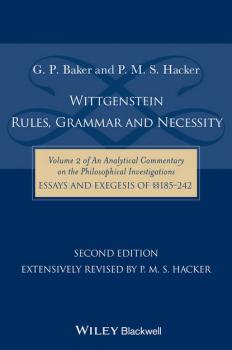ТОП просматриваемых книг сайта:
P. Hacker M.S.
Список книг автора P. Hacker M.S.Аннотация
This is a new edition of the first volume of G.P.Baker and P.M.S. Hacker’s definitive reference work on Wittgenstein’s Philosophical Investigations. Takes into account much material that was unavailable when the first edition was written. Following Baker’s death in 2002, P.M.S. Hacker has thoroughly revised the first volume, rewriting many essays and sections of exegesis completely. Part One – the Essays – now includes two completely new essays: 'Meaning and Use' and 'The Recantation of a Metaphysician'. Part Two – Exegesis §§1–184 – has been thoroughly revised in the light of the electronic publication of Wittgenstein’s Nachlass, and includes many new interpretations of the remarks, a history of the composition of the book, and an overview of its structure. The revisions will ensure that this remains the definitive reference work on Wittgenstein’s masterpiece for the foreseeable future.
Аннотация
This is a new edition of the first volume of G.P.Baker and P.M.S. Hacker’s definitive reference work on Wittgenstein’s Philosophical Investigations. New edition of the first volume of the monumental four-volume Analytical Commentary on the Philosophical Investigations. Takes into account much material that was unavailable when the first edition was written. Following Baker’s death in 2002, P.M.S. Hacker has thoroughly revised the first volume, rewriting many essays and sections of exegesis completely. Part One – the Essays – now includes two completely new essays: 'Meaning and Use' and 'The Recantation of a Metaphysician'. Part Two – Exegesis §§1-184 – has been thoroughly revised in the light of the electronic publication of Wittgenstein’s Nachlass, and includes many new interpretations of the remarks, a history of the composition of the book, and an overview of its structure. The revisions will ensure that this remains the definitive reference work on Wittgenstein’s masterpiece for the foreseeable future.
Аннотация
The Second Edition of Wittgenstein: Rules, Grammar and Necessity (the second volume of the landmark analytical commentary on Wittgenstein’s Philosophical Investigations) now includes extensively revised and supplemented coverage of the Wittgenstein's complex and controversial remarks on following rules. Includes thoroughly rewritten essays and the addition of one new essay on communitarian and individualist conceptions of rule-following Includes a greatly expanded essay on Wittgenstein’s conception of logical, mathematical and metaphysical necessity Features updates to the textual exegesis as the result of taking advantage of the search engine for the Bergen edition of the Nachlass Reflects the results of scholarly debates on rule-following that have raged over the past 20 years
Аннотация
A survey of astonishing breadth and penetration. No cognitive neuroscientist should ever conduct an experiment in the domain of the emotions without reading this book, twice. Parashkev Nachev, Institute of Neurology, UCL There is not a slack moment in the whole of this impressive work. With his remarkable facility for making fine distinctions, and his commitment to lucidity, Peter Hacker has subtly characterized those emotions such as pride, shame, envy, jealousy, love or sympathy which make up our all too human nature. This is an important book for philosophers but since most of its illustrative material comes from an astonishing range of British and European literature, it is required reading also for literary scholars, or indeed for anyone with an interest in understanding who and what we are. David Ellis, University of Kent Human beings are all subject to boundless flights of joy and delight, to flashes of anger and fear, to pangs of sadness and grief. We express our emotions in what we do, how we act, and what we say, and we can share our emotions with others and respond sympathetically to their feelings. Emotions are an intrinsic part of the human condition, and any study of human nature must investigate them. In this third volume of a major study in philosophical anthropology which has spanned nearly a decade, one of the most preeminent living philosophers examines and reflects upon the nature of the emotions, advancing the view that novelists, playwrights, and poets – rather than psychologists and cognitive neuroscientists – elaborate the most refined descriptions of their role in human life. In the book’s early chapters, the author analyses the emotions by situating them in relation to other human passions such as affections, appetites, attitudes, and agitations. While presenting a detailed connective analysis of the emotions, Hacker challenges traditional ideas about them and criticizes misconceptions held by philosophers, psychologists, and cognitive neuroscientists. With the help of abundant examples and illustrative quotations from the Western literary canon, later sections investigate, describe, and disentangle the individual emotions – pride, arrogance, and humility; shame, embarrassment, and guilt; envy and jealousy; and anger. The book concludes with an analysis of love, sympathy, and empathy as sources of absolute value and the roots of morality. A masterful contribution, this study of the passions is essential reading for philosophers of mind, psychologists, cognitive neuroscientists, students of Western literature, and general readers interested in understanding the nature of the emotions and their place in our lives.
Аннотация
The Intellectual Powers is a philosophical investigation into the cognitive and cogitative powers of mankind. It develops a connective analysis of our powers of consciousness, intentionality, mastery of language, knowledge, belief, certainty, sensation, perception, memory, thought, and imagination, by one of Britain’s leading philosophers. It is an essential guide and handbook for philosophers, psychologists, and cognitive neuroscientists. The culmination of 45 years of reflection on the philosophy of mind, epistemology, and the nature of the human person No other book in epistemology or philosophy of psychology provides such extensive overviews of consciousness, self-consciousness, intentionality, mastery of a language, knowledge, belief, memory, sensation and perception, thought and imagination Illustrated with tables, tree-diagrams, and charts to provide overviews of the conceptual relationships disclosed by analysis Written by one of Britain’s best philosophical minds A sequel to Hacker’s Human Nature: The Categorial Framework An essential guide and handbook for all who are working in philosophy of mind, epistemology, psychology, cognitive science, and cognitive neuroscience





